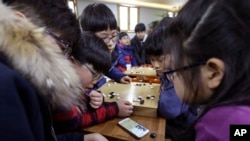Google's Go-playing computer program has again defeated world champion Lee Sedol in the final round of a five-game match that sealed its 4-to-1 victory.
"I am disappointed that the matches are over, and also disappointed that I could not end the series on a high note," said Lee during a news conference following Tuesday's game.
The South Korean, who has won 18 international Go titles, said he is not sure he would be able to win even he was able to compete against AlphaGo again due to what he said was the machine's "high level of concentration."
"Certainly, humans cannot catch up in terms of concentrating ability, rather than playing capability," Lee said. "I cannot admit that (AlphaGo) has a better playing capability, though."
Lee and AlphaGo played a best-of-five-games, human vs. machine challenge of the ancient Chinese game Go, considered one of the most complex board games.
Go, which originated in China more than 2,500 years ago, is a complex game with an almost incalculable number of move options. The game involves two players who take turns placing black and white stones on a grid-shaped board. The winner is the player who manages to seal off more territory.
The most famous AI victory to date was in 1997, when the IBM-developed supercomputer Deep Blue beat then-world class chess champion Garry Kasparov.
AlphaGo is an artificial intelligence (AI) program developed by Google's DeepMind team. It uses "reinforcement learning," meaning the program plays against itself and adjusts its own neural networks based on trial and error, its creators said.
"As we said before, we have learnt many things I think that AlphaGo and things we can improve," said Demis Hassabis, CEO of Google DeepMind.
DeepMind says the technology has far-ranging, real-world applications from making smartphones smarter to health care.
Hassabis says his team is undecided as to whether they will further develop the software by playing more matches or prepare to release the technology to the general public. "We haven't decided yet."





